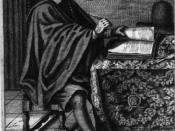Descartes' wake/sleep contrast is central to his famous Dream Argument, whereby he is can find no conceivable way to differentiate between whether he is either dreaming or awake in their perceptions of the environment. As Descartes states in his Meditation 1:
"â¦and to experiencing in my dreams the very same things, or now and then even less plausible ones, as these insane people do when they are awake. How often does my evening slumber persuade me of such ordinary things as these: that I am here, clothed in my dressing gown, seated next to the fireplace--when in fact I am lying undressed in bed!"
One would argue that we would be able to differentiate dreams from reality by willing on ourselves a conscious action, i.e. raising our hands or through our senses, i.e. feelings of pain. However, Descartes masterfully reveals another significant aspect of his Dream argument, that even these perceptions through our senses could easily have been the product of a dream, imitating these instances of apparent reality.
"â¦As if I did not recall having been deceived on other occasions even by similar thoughts in my dreams! As I consider these matters more carefully, I see so plainly that there are no definitive signs by which to distinguish being awake from being asleep."
On reflection, Descartes shows that he (and neither us) can think of any phenomenon that might occur in waking life that would indicate that we were awake.
Descartes also uses the wake/sleep contrast to great extent in his Demon Argument, one of philosophy's greatest tools for "hyperbolic doubt", to doubt everything in order to arrive to a set of conclusions that are indubitably true. The Demon Argument again amplifies the significance of the wake/sleep contrast by considering that our all our apparent similarities during...


